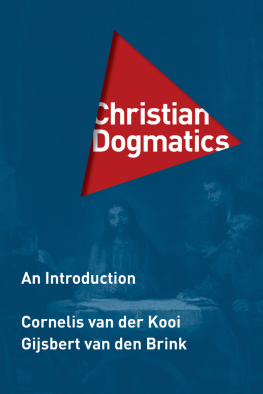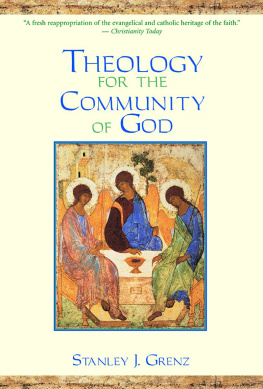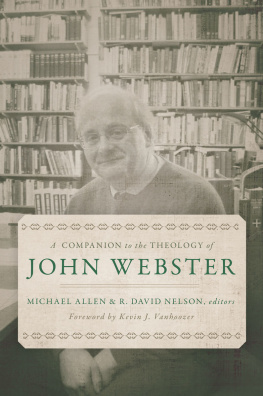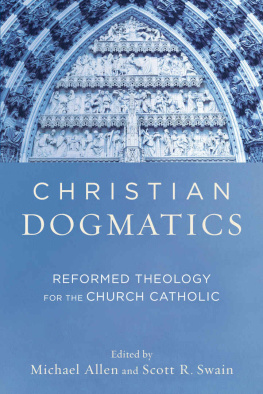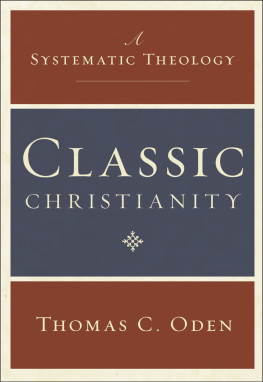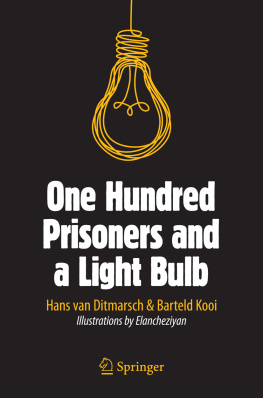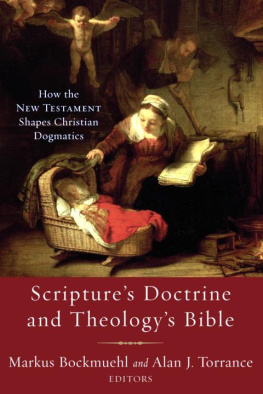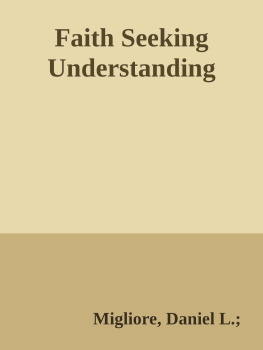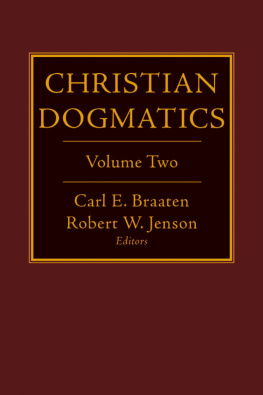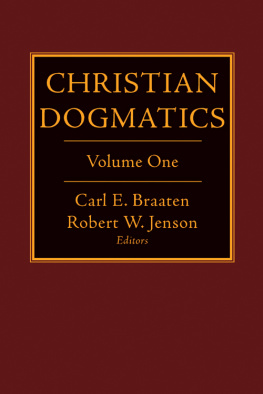This fine work was widely praised by Dutch readers when it first appeared in the Netherlands, going through several printings. Now all of us English speakers can see what the enthusiasm was all about. The subtitle correctly presents the book as an introduction, but it is more than that. For me it has servedand will continue to serveas a much-needed refresher course in how to bring new vitality to the exploration and twenty-first-century updating of the best of the theology that we have received from the past!
RICHARD J. MOUW
Fuller Theological Seminary
Despite the impact of Dutch Reformed theology in the English-speaking world, few contemporary sources are translated. With this new dogmatics, we may be considerably caught up. Yet this volume is not in the least provincial. Deeply informed by biblical studies as well as the history of doctrine, the authors engage a wide range of conversation partners. As insiders, legatees, and contributors to continental theological developments, they offer a crucial perspective for ecumenical conversation.
MICHAEL S. HORTON
Westminster Seminary California
It is essential that Christians know what they believe and why they believe what they profess. This is one of the best and most helpful one-volume summaries of Christian thought published in the last several decades. Valuable for Christians everywhere in the world, regardless of their cultural and linguistic heritage, van der Kooi and van den Brinks Christian Dogmatics is accessible, clear, inspiring, informative, and very readable. This work should be in every pastors library. It would also make an excellent resource for a church study group.
CHARLES VAN ENGEN
Latin American Ministries, Inc.
School of Intercultural Studies,
Fuller Theological Seminary
To the surprise of a variety of its critics, the oft-maligned discipline of dogmatic theology is showing signs of renewed health of which this volume is one. Now non-Dutch readers can see for themselves why this Christian Dogmatics became such a best-seller in its native land. It provides a cogent, fresh, confident statement of the Christian faith that honestly engages the tough challenges our modern world throws at it. In addition, this work is a pedagogic success: each chapter begins with a clear statement of aims, provides measurable goals, and makes meaningful connections to contemporary issues and questions. This is a great text for students of Christian theology that is also accessible to all who want to deepen their understanding of the faith.
JOHN BOLT
Calvin Theological Seminary
Christian Dogmatics
AN INTRODUCTION
Cornelis van der Kooi and Gijsbert van den Brink
Translated by Reinder Bruinsma with James D. Bratt
WILLIAM B. EERDMANS PUBLISHING COMPANY
GRAND RAPIDS, MICHIGAN
Wm. B. Eerdmans Publishing Co.
2140 Oak Industrial Drive NE, Grand Rapids, Michigan 49505
www.eerdmans.com
2017 Wm. B. Eerdmans Publishing Co.
All rights reserved
Originally published in Dutch as Christelijke dogmatiek: Een inleiding, 2012 Uitgeverij Boekencentrum, Zoetermeer, Netherlands
English translation published 2017
ISBN 978-0-8028-7265-4
eISBN 978-1-4674-4699-0
23 22 21 20 19 18 171 2 3 4 5 6 7
Library of Congress Cataloging-in-Publication Data
Names: Brink, Gijsbert van den, 1963 author.
Title: Christian dogmatics : an introduction / Gijsbert van den Brink and Cornelis van der Kooi ; translated by Reinder Bruinsma with James D. Bratt.
Other titles: Christelijke dogmatiek. English
Description: Grand Rapids : Eerdmans Publishing Co., 2017. | Includes bibliographical references and index.
Identifiers: LCCN 2016053088 | ISBN 9780802872654 (hardcover : alk. paper)
Subjects: LCSH: Theology, Doctrinal. | Reformed ChurchDoctrines.
Classification: LCC BT75.3 .B7513 2017 | DDC 230/.42dc23
LC record available at https://lccn.loc.gov/2016053088
Contents
We are greatly indebted to Reinder Bruinsma, who is an experienced translator of Dutch theological literature into English, for providing a very reliable and smooth translation of this voluminous work in a relatively short time. Our American colleague Jim Bratt (Calvin College, Grand Rapids, MI), has carefully checked the flow of the English, pointed out possible sources of misunderstanding for an Anglo-Saxon audience, and proposed quite a few improvements, in both style and content. We are greatly in his debt. We also thank our former student-assistant Ruben van den Belt for providing us with references to English versions of sources we originally quoted in Dutch or German.
Since we realized that it would not make much sense to quote sources that are available only in Dutch, we substantially reduced the number of references to Dutch sources. Yet, we intentionally did not go to great lengths to remove every trace of the Dutch context within which this volume originally took shape. Especially in the case of twentieth-century Dutch theologians who have been (and in many cases still are) very influential in the Netherlands and beyond (e.g., in South Africa), and because of the scope, originality, creativity, and quality of their theological work, we decided to leave instructive references to their work unaltered, even though for now it may be available only in Dutch. Here we are thinking especially of the work of twentieth-century theologians like K. H. Miskotte, O. Noordmans, and A. A. van Ruler. It is good for an international audience to see that Dutch theology did not stop with Kuyper and Bavinck, however important the work of these two earlier giants was and still is. Finally, we decided to refer to German sources in English translation, where one was available, but we did not hesitate to quote German sources when there was no Anglophone alternative.
CORNELIS VAN DER KOOI &
GIJSBERT VAN DEN BRINK
Amsterdam, January 2016
We decided to title this book Christian Dogmatics. For a number of reasons such a title may evoke questions or even be seen as a provocation. Who in their right mind would consider publishing a book with this title? Dogmatics is surrounded with so many negative associations that the word alone creates an immediate barrier. Moreover, the adjective Christian can be quite pretentious. (Do we think we can write for the entire Christian tradition?) We therefore begin with a few remarks telling why we refer to this book on dogmatics as Christian. It is true enough that we cannot possibly write for the whole Christian tradition, or even do limited justice to Christianity in all its diversity. And we admit at the outset that we write from within the context of the Reformed faith tradition. This work, however, is not intended as a dogmatics for Reformed Christians only. Dogmatics must always keep the entire faith community in mind. What Karl Barth wrote about confessions of faith (GA 3:610) applies in a derived sense to this book: we are dealing with insights that arose in specific circumstances, within a specific tradition-historical constellation, but that need to be submitted to the judgment of the entire (world) church, and not just to a part of it.
Likewise, the term dogmatics deserves a few comments. Why did we choose this word, rather than some synonym that would sound somewhat milder? The choice is meant to be evocative rather than provocative. In this dogmatics we do not think of dogma as teachings that have been imposed in an authoritarian way; rather, dogma is simply what the Christian church wants to continue to emphasize: the momentous news of Gods intervention in Jesus Christ. The church has found things that it does not want to surrender, which it regards as the basis for an unbelievable perspective in life. It is precisely this meaning, with all that it entails, that the word dogma conveys. If this is provocative with regard to secularismwhich of course has also affected usthen we are just where we want to be: where the rubber hits the road.

